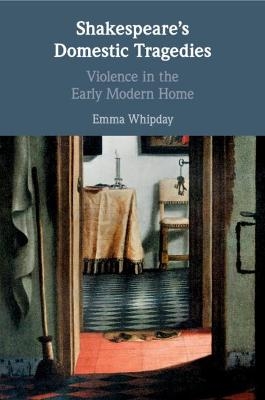
Shakespeare's Domestic Tragedies
Violence in the Early Modern Home
Seiten
2020
Cambridge University Press (Verlag)
978-1-108-46330-0 (ISBN)
Cambridge University Press (Verlag)
978-1-108-46330-0 (ISBN)
This book explores the relationship between Shakespeare's most famous tragedies and the genre of 'domestic tragedy': plays about murder and adultery in ordinary households. In tracing representations of violent homes in early modern culture, Emma Whipday proposes a new way of reading Hamlet, Othello, and Macbeth.
Domestic tragedy was an innovative genre, suggesting that the lives and sufferings of ordinary people were worthy of the dramatic scope of tragedy. In this compelling study, Whipday revises the narrative of Shakespeare's plays to show how this genre, together with neglected pamphlets, ballads, and other forms of 'cheap print' about domestic violence, informed some of Shakespeare's greatest works. Providing a significant reappraisal of Hamlet, Othello, and Macbeth, the book argues that domesticity is central to these plays: they stage how societal and familial pressures shape individual agency; how the integrity of the house is associated with the body of the housewife; and how household transgressions render the home permeable. Whipday demonstrates that Shakespeare not only appropriated constructions of the domestic from domestic tragedies, but that he transformed the genre, using heightened language, foreign settings, and elite spheres to stage familiar domestic worlds.
Domestic tragedy was an innovative genre, suggesting that the lives and sufferings of ordinary people were worthy of the dramatic scope of tragedy. In this compelling study, Whipday revises the narrative of Shakespeare's plays to show how this genre, together with neglected pamphlets, ballads, and other forms of 'cheap print' about domestic violence, informed some of Shakespeare's greatest works. Providing a significant reappraisal of Hamlet, Othello, and Macbeth, the book argues that domesticity is central to these plays: they stage how societal and familial pressures shape individual agency; how the integrity of the house is associated with the body of the housewife; and how household transgressions render the home permeable. Whipday demonstrates that Shakespeare not only appropriated constructions of the domestic from domestic tragedies, but that he transformed the genre, using heightened language, foreign settings, and elite spheres to stage familiar domestic worlds.
Emma Whipday is Lecturer in Renaissance Literature at Newcastle University.
Introduction: Shakespeare's domestic tragedies; 1. Home: contesting domestic order in The Taming of the Shrew; 2. Household: performing domestic relationships in Hamlet; 3. House: staging domestic space in Othello; 4. Neighbourhood: crossing domestic boundaries in Macbeth; Afterword – outside domestic tragedy in King Lear.
| Erscheinungsdatum | 01.10.2020 |
|---|---|
| Zusatzinfo | Worked examples or Exercises; 1 Halftones, color; 8 Halftones, black and white |
| Verlagsort | Cambridge |
| Sprache | englisch |
| Maße | 152 x 228 mm |
| Gewicht | 408 g |
| Themenwelt | Literatur ► Lyrik / Dramatik ► Dramatik / Theater |
| Geisteswissenschaften ► Sprach- / Literaturwissenschaft ► Anglistik / Amerikanistik | |
| Geisteswissenschaften ► Sprach- / Literaturwissenschaft ► Literaturgeschichte | |
| Geisteswissenschaften ► Sprach- / Literaturwissenschaft ► Literaturwissenschaft | |
| ISBN-10 | 1-108-46330-4 / 1108463304 |
| ISBN-13 | 978-1-108-46330-0 / 9781108463300 |
| Zustand | Neuware |
| Informationen gemäß Produktsicherheitsverordnung (GPSR) | |
| Haben Sie eine Frage zum Produkt? |
Mehr entdecken
aus dem Bereich
aus dem Bereich


